
Aug 22
1864 International Red Cross founded:
The Geneva Convention of 1864 for the Amelioration of the Condition of the Wounded and Sick of Armies in the Field is adopted by 12 nations meeting in Geneva. The agreement, advocated by Swiss humanitarian Jean-Henri Dunant, called for nonpartisan care to the sick and wounded in times of war and provided for the neutrality of medical personnel. It also proposed the use of an international emblem to mark medical personnel and supplies. In honor of Dunant's nationality, a red cross on a white background—the Swiss flag in reverse—was chosen. In 1901, Dunant was awarded the first Nobel Peace Prize.
In 1881, American humanitarians Clara Barton and Adolphus Solomons founded the American National Red Cross, an organization designed to provide humanitarian aid to victims of wars and natural disasters in congruence with the International Red Cross.
1887 Birth: Lutz Graf Schwerin von Krosigk: last German Chancellor of the Third Reich. A non-partisan conservative, Schwerin von Krosigk was appointed Minister of Finance by Franz von Papen in 1932, and continued in that office at the request of President Paul von Hindenburg under Kurt von Schleicher and throughout the period of Nazi Party rule. Several members of his family took part in assassination attempts against Adolf Hitler. Schwerin von Krosigk was rarely seen in public appearances and Hitler did not have regular Cabinet meetings, so he was more of an apolitical manager of his ministry. On May 1, 1945, Schwerin von Krosigk was appointed Leading Minister of the Acting Government (in effect, Chancellor) by President Karl Doenitz. Doenitz and Schwerin von Krosigk attempted to negotiate an armistice with the Western allies while continuing to resist the Soviet Army, but the government was not recognized by the Allies and was dissolved when its members were captured by British forces on May 23, 1945, at Flensburg. Schwerin von Krosigk was held in captivity until he was released during an amnesty in 1951.
Birth: Dorothy Parker: American short story writer and poet: When told that Calvin Coolidge is dead, she will ask: "How can they tell?"
1902 Birth: Leni Riefenstahl: [Her] career included work as a dancer, actress, film producer, director, and also a photographer, but the rest of Leni Riefenstahl's career was shadowed by her history as a documentary maker for Hitler and Germany's Third Reich.
Hitler: Lamberg Castle
1909 Vienna days: As is required by law, Hitler registers his change-of-residence with the local Vienna police. He puts down "writer" in the space for occupation. [For further details, Click here.]
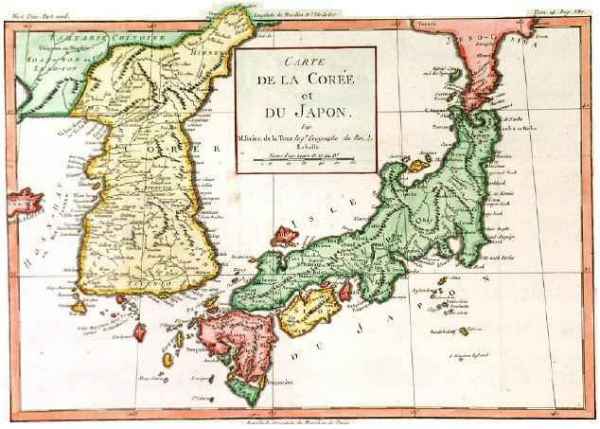
1910 Korea: Beginning in 1876, the Japanese forced a series of Western-style trade agreements on Korea, leading to Japan's eventual annexation of the country in 1910. Due to growing anti-Japanese sentiment, in 1897 King Kojong declared himself to be Emperor of the Taehan Empire, an independent Korea. However, during the Russo-Japanese War (1904-1905), Japanese forces moved onto the peninsula, despite Korean declarations of neutrality. The signing of the Japan-Korea Protection Treaty in 1905 gave Japan virtual control over Korea, and in 1910 a Korean royal proclamation announced the annexation by apan.
[See: Countdown to Infamy: Timeline to Pearl Harbor.]
1914 World War I: Various:
News reports published in the newspapers on both sides during these early days of the conflict are nothing more than war propaganda, and not very good propaganda at that. The British and French press tell tales of German atrocities against women and children, while demonizing the Kaiser and all Germans as Boches and Huns. Since only very small slivers of German territory experience the presence of enemy soldiers, the German papers publish improbable stories of atrocities committed against German soldiers by French and Belgian civilians.
From the report of a German "correspondent" in London published in the Berliner Tageblatt:The word, on every street corner and in every Englishman's mouth was . . . . Mad dog! Der tolle Hund—that was Germany! . . . . On the street corner reigns the Terror of the Yellow Press. The serious newspapers "Telegraph", "News" continue to exhort calm at first, the one in the morning, the other in the evening. Between morning and evening however, every five minutes, the newspaper boys announce new and newer editions of the two, three most popular halfpenny papers, which even in times of peace had been making business exclusively out of scandal. [For further details, Click here.]
Heavy casualties suffered in the Battles of the Frontiers:
On August 22, 1914, as French and German forces face off on the Western Front during the opening month of the First World War, the isolated encounters of the previous day move into full-scale battle in the forests of the Ardennes and at Charleroi, near the junction of the Sambre and Meuse Rivers. [For further details, Click here.]

1915 World War I: Various:
List Regiment: Gefreiter Adolf Hitler's 16 Reserve Infantry Regiment continue to occupy a position at Fromelles—pictured above in a drawing by Hitler—on a level field with water channels, willow trees and willow stalks; in the distance towards the enemy lines, lies an insignificant wood with barbed wire entanglements. Under the direction of their defense-minded commander, Lieutenant General Gustav Scanzoni von Lichtenfels, the regiment works ceaselessly day and night to further fortify their position at Fromelles while fighting off repeated assaults by the enemy. [For further details, Click here.]
Birth: Edward Szczepanik: Polish economist and Prime Minister in exile: During the Polish September Campaign, Szczepanik was interned in Lithuania and later captured by the Soviet forces. From 1940 until 1942, he was a prisoner of the Soviet Gulag camps in Kozielsk and Kola Peninsula. As an Officer (eventually Major) in the Polish Army he served with distinction in the Fifth Polish Artillery Regiment notably in the battles of Monte Cassino, Ancona and Bologna. He was one of the first Allied troops to enter Bologna. In 1945 he received the Cross of the Valorous. In 1946 he was also awarded the Silver Cross of Merit with Swords and, by the King of Italy, the Italian Cross of Military Merit and several other Polish and British campaign medals.
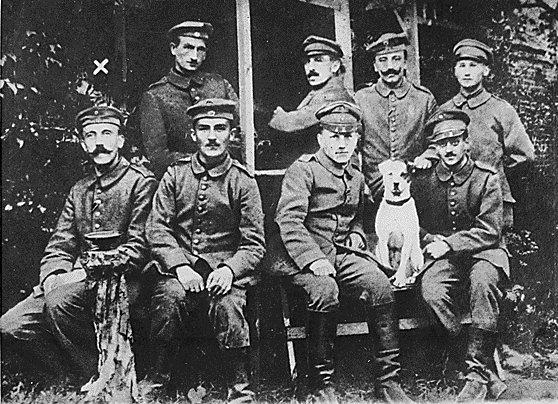
1916 World War I: List Regiment: Gefreiter Adolf Hitler endures trench warfare in Flanders (Artois) with 3 Company, 16 Reserve Infantry Regiment [List Regiment]. [For further details, Click here.]
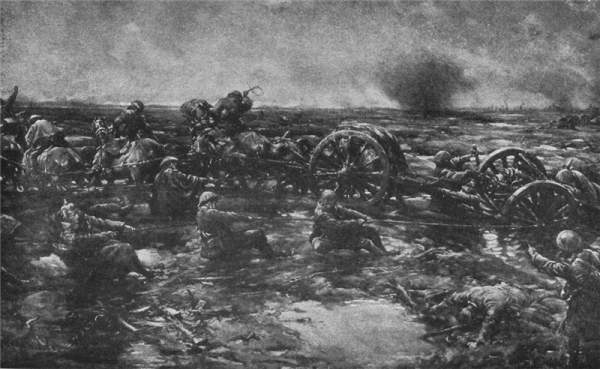
1917 World War I: List Regiment (July 22-September 8): Dispatch Runner Gefreiter Adolf Hitler serves at the front with 3 Company, 16 Bavarian Reserve Infantry Regiment during Phase 2 operations in Flanders. Most of their time in the trenches gas masks are worn, while English bombers attack from the air, and tanks attempt to advance over a long front through seas of mud. [For further details, Click here.]
List Regiment (August 21-25): Gefreiter Adolf Hitler attends a signals training course in Nuremberg. [For further details, Click here.]
1922 Michael Collins assassinated:
In the early part of the century, Collins joined Sinn Fein, an Irish political party dedicated to achieving independence for all Ireland. From its inception, the party became the unofficial political wing of militant Irish groups in their struggle to throw off British rule. In 1911, the British Liberal government approved negotiations for Irish Home Rule, but the Conservative Party opposition in Parliament, combined with Ireland's anti-Home Rule factions, defeated the plans. With the outbreak of World War I, the British government delayed further discussion of Irish self-determination, and Collins and other Irish nationalists responded by staging the Easter Rising of 1916.
In 1918, with the threat of conscription being imposed on the island, the Irish people gave Sinn Fein a majority in national elections, and the party established an independent Irish parliament, Dail Eireann, which declared Ireland a sovereign republic. In 1919, Collins led the Irish Volunteers, a prototype of the Irish Republican Army, in a widespread and effective guerrilla campaign against British forces. Two years later, a cease-fire was declared, and Collins was one of the architects of the historic 1921 peace treaty with Great Britain, which granted autonomy to southern Ireland.
In January 1922, Sinn Fein founder Arthur Griffith was elected president of the newly established Irish Free State, and Collins was appointed as his finance minister. He held the post until he was assassinated by Republican extremists in August 1922. (History.com)
1939 Countdown to World War II: Various:
Memorandum by the State Secretary in the German Foreign Office (Weizsaecker):
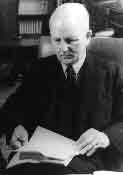
The ideas of (Japanese Ambassador) Oshima were, as was to be expected, along two lines: 1) If Russia were relieved of anxiety in Europe, she would strengthen her East Asiatic front and put new life into the Chinese war. 2) The jurists in Tokyo (and there were a great many of them) would debate the consistency of our present proceedings with certain earlier German-Japanese conversations. Oshima added that there was no use in trying to interfere with accomplished facts. He did, however, look for a certain shock in Japan, and he would like to abate this by making a telegraphic report tonight. My discussion was along lines somewhat as follows: 1) We were doing nothing which would put in question our friendly relationship with Japan. On the contrary, we would continue to maintain that, and we esteemed the personalities, like Oshima, who had acted and would act most vigorously to that end. 2) The present proceedings were not a cause for surprise inasmuch as the Reich Foreign Minister had informed the Ambassador some months previously that a normalization of German-Russian relations was worth attempting. 3) Such an arrangement would also put us in a position to take steps to bring about a period of quiet in Japanese-Russian relations and to insure its continuance for a considerable period of time. That Japan was at the moment not seeking a Japanese-Russian conflict was certain. I had even received from the Russian side the impression that a Moscow-Tokyo agreement would be welcomed there.
Telegram from Adolf Hitler to the Reich Foreign Minister, Herr Joachim von Ribbentrop:
I hereby grant full power to negotiate, in the name of the German Reich, with authorized representatives of the Government of the Union of Soviet Socialist Republics, regarding a non-aggression treaty, as well as all related questions, and if occasion arises, to sign both the non-aggression treaty and other agreements resulting from the negotiations, with the proviso that this treaty and these agreements shall enter into force as soon as they are signed.
From M. Garreau, French Consul-General in Hamburg to Minister for Foreign Affairs:
I learn on good authority that the German Government hopes, by a lightning attack, to dispose of Poland before the end of the month. The Reich seems to be convinced that Great Britain and France, equally disconcerted by the Russian attitude, will not move. The Reich believes that Moscow is preparing a great political upheaval which would tend to bring the ideologies of the two totalitarian regimes into harmony. The rumour that the offensive against Poland would be launched on August 22 has been circulating in Hamburg for several days. A great number of railway employees have been ordered to report in various Polish towns, notably in Warsaw, Ibrun and Poznan, on a date which would be notified towards the end of the month. From this it would seem that the occupation of these centres by the German Army was expected very soon. Many motor-cars have been requisitioned in Hamburg. They are at once given military numbers and repainted grey. The departure of the 20th Mechanized Division for the Polish frontier has taken place within the last 48 hours; these troops left Hamburg partly by train and partly in three motor convoys.
Neville Chamberlain writes a letter to Hitler—warning him the German-Soviet Agreement will not alter Britain's obligation to come to the aid of Poland. Note: Hitler will remain convinced that Chamberlain is bluffing, as he will also misjudge Neville's successor.
Your Excellency will have already heard of certain measures taken by His Majesty's Government, and announced in the press and on the wireless this evening. These steps have, in the opinion of His Majesty's Government, been rendered necessary by the military movements which have been reported from Germany, and by the fact that apparently the announcement of a German-Soviet Agreement is taken in some quarters in Berlin to indicate that intervention by Great Britain on behalf of Poland is no longer a contingency that need be reckoned with. No greater mistake could be made.
USSR: Sir William Seeds, British Ambassador in Moscow, accuses Molotov of negotiating in bad faith.
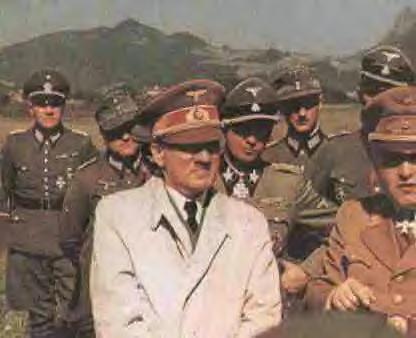
Hitler speaks at Obersalzberg:
The decision to attack Poland was arrived at in the spring. Originally there was fear that because of the political constellation we would have to strike at the same time against England, France, Russia and Poland. This risk, too, we should have had to take. Goering had demonstrated to us that his Four-Year Plan is a failure and that we are at the end of our strength, if we do not achieve victory in a coming war. Since the autumn of 1938 and since I have realized that Japan will not go with us unconditionally. [For the full text, Click here.]
From Khrushchev Remembers by Nikita Khrushchev:I believe the Ribbentrop-Molotov Pact of 1939 was historically inevitable, given the circumstances of the time, and that in the final analysis it was profitable for the Soviet Union. It was like a gambit in chess: if we hadn't made that move, the war would have started earlier, much to our disadvantage. It was very hard for us—as Communists, as anti-fascists—to accept the idea of joining forces with Germany. It was difficult enough for us to accept the paradox ourselves.
For their part, the Germans too were using the treaty as a maneuver to win time. Their idea was to divide and conquer the nations which had united against Germany in World War I and which might unite against Germany again. Hitler wanted to deal with his adversaries one at a time. He was convinced that Germany had been defeated in World war I because he tried to fight on two fronts at once. The treaty he signed with us was his way of trying to limit the coming war to one front.
Church and Reich Aug 22-24: The Fulda Bishop's Conference of 1939 includes the bishops of Austria and the Sudetenland for the first time. All are aware of the 'Top Secret' instructions of July 17. (THP)
1941 Barbarossa: Various:
German troops reach Leningrad, leading to the siege of Leningrad. Guderian flies to see Hitler, to convince him of the need to drive on Moscow. Hitler refuses, stating, "my generals know nothing about the economic aspects of war." The drive south continues. (THP)
Major Ivan Kononov, commander of the 436th Regiment, and his entire regiment of Cossacks defects to the Germans after launching a successful counterattack against them. Kononov's was the first of many Cossack units to change sides during the war. By the fall of 1942 more than 200 Cossack battalions and regiments fought alongside the German army. (THP)
1941 Holocaust: The remaining 90 Jewish children held in the village of Byelaya Tserkov, most of them infants under the age of five, are executed after the action is officially condoned by the Wehrmacht. (THP)
1942 World War II: After U-boats sinks several Brazilian ships, Brazil declares war on Germany and Italy. Two years later Brazil will send the 'Brazilian Expeditionary Force' to Italy, the only South American country to send combat forces to Europe.
The defense of the Brazilian bulge against external attack during 1942 was mainly provided far afield by the Soviet forces resisting the sweep of Nazi arms, by the British forces checking the Axis drive into Egypt, and by the United States Navy's success in stopping the tide of Japanese advance in the Pacific. Nearer at hand, the United States Army had ground and air forces in the Caribbean area and in the continental United States that could have been deployed to Brazil in the event of a real emergency. The most effective combat element close at hand was the United States Navy's South Atlantic Force, with which Brazilian naval and air forces began to operate.
1942 World War II: The advance of German forces toward the Black Sea port of Suchum west of the Caucasus bogs down.
1943 World War II: Various:
Joseph Goebbels delivers yet another pep-talk to the German people:
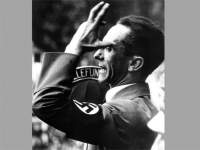
Mature political judgment requires not only understanding, but also imagination. That is what generally is missing in those who shout their opinions the loudest. They take pleasure in balancing the war's accounts, which on close examination rarely holds up. That is particularly true at critical points in this struggle for existence. As Clausewitz said, there is a false wisdom that only wants to escape danger. In ordinary times one can easily talk of heroism, since it requires no burdens or dangers. Only real danger reveals a person's true character. Previously hidden traits, whether good or bad, reveal themselves. One must prove whether he is a hero or a coward by deeds, not words. It is well known that those who make the most noise in good times do the same in bad times. In good times they are filled with illusions, in bad times with hopelessness and pessimism. One can only hold them in contempt; they deserve nothing else, certainly nothing better. Thankfully, such people are a tiny minority by us, and they have no influence.
1943 Slave labor: Alarmed at the destruction of the rocket facilities at Peenemuende, Speer and Himmler confer at Rastenburg with their Fuehrer. Heinrich Himmler offers to use concentration camp workers for A-4 production, and Hitler takes him up on it, ordering that some prisoners from Buchenwald be shifted to Nordhausen. Speer's ministry will pay all the bills. Himmler places SS Brigadefuehrer Hans Kammler, a ruthless Nazi of the worst sort, in change of what will become known as Camp Dora. Note: 60,000 prisoners will be funneled into the camp, half will perish. (Sereney, Sellier, Cornwell, Piszkiewicz)
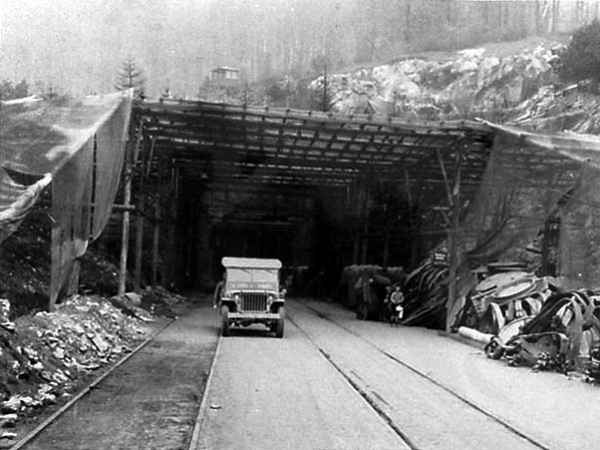
I knew of the subterranean works which were near Nordhausen, though I never was there myself. But they had been established at a rather early period. Nordhausen produced mainly V-1s and V-2s. With the conditions in Camp Dora, as they have been described, I am not familiar. I also believe that they are exaggerated. Of course, I knew that subterranean factories were being built. I was also interested in the construction of further plants for the Luftwaffe. I cannot see why the construction of subterranean works should be something particularly wicked or destructive. I had ordered construction of an important subterranean work at Kahla in Thuringia for airplane production in which, to a large extent, German workers and, for the rest, Russian workers and prisoners of war were employed. I personally went there to look over the work being done and on that day found everyone in good spirits. On the occasion of my visit I brought the people some additional rations of beverages, cigarettes, and other things, for Germans and foreigners alike. The other subterranean works for which I requested concentration camp internees were not built any more.

At first, we were not sure what he had found . . . it was about 4 meters long, and it might have been a rather larger version of the HS 293 glider bomb that KG100 was now using against our warships in the Mediterranean. Indeed, it turned out that this particular bomb had been released from a Heinkel III, but it was in fact a research model (the "V" probably stood for "Versuchs" i.e. research) of the flying bomb about which we were going to hear so much in the next few months. (Kilzer)
[See: Wunderwaffen: Hitler's Deception and the History of Rocketry.]1944 World War II: Various:
Romania captured by the Soviet Union: On this day in 1944, Soviet forces break through to Jassy, in northeastern Romania, convincing Romania's king to sign an armistice with the Allies and concede control of his country to the USSR. [For further details, Click here.]
Stalin to Churchill and FDR:
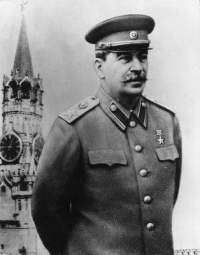
I have received the message from you and Mr. Roosevelt about Warsaw. I wish to express my opinions. Sooner or later the truth about the group of criminals who have embarked on the Warsaw adventure in order to seize power will become known to everybody. These people have exploited the good faith of the inhabitants of Warsaw, throwing many almost unarmed people against the German guns, tanks, and aircraft. A situation has arisen in which each new day serves, not the Poles for the liberation of Warsaw, but the Hitlerites who are inhumanly shooting down the inhabitants of Warsaw. From the military point of view, the situation which has arisen, by increasingly directing the attention of the Germans to Warsaw, is just as unprofitable for the Red Army as for the Poles. Meanwhile the Soviet troops, which have recently encountered new and notable efforts by the Germans to go over to the counterattack, are doing everything possible to smash these counterattacks of the Hitlerites and to go over to a new wide-scale attack in the region of Warsaw. There can be no doubt that the Red Army is not sparing its efforts to break the Germans round Warsaw and to free Warsaw for the Poles. That will be the best and most effective help for the Poles who are anti-Nazis.
Churchill to Eden::
I like Papandreou, and there are great advantages in the removal of the Greek Government from the Ciaro atmosphere. I think it will do good to have an alert Greece both of foes and friends such as will be produced by its movement. But, while the military affairs are being planned and sorted out here under my direction in accordance with the wishes you expressed, a date cannot be fixed; it must be fitted with other needs, unless the situation itself takes charge. I cannot be ready to act for a month, but thereafter we may be able to pounce when the going is good.
The defeat of Falaise-Argentan breaks the back of the Nazi defenses in France: The Allies capture more than 100,000 prisoners. Thirty-two Spaniards & four French Maquis tackle a German column (1,300 men in 60 lorries, with 6 tanks & 2 self-propelled guns), at La Madeiline, France. Three Maquis are wounded, with 110 Germans killed and 200 wounded.
Preservation of Bordeaux: German officer Heinz Stahlschmidt blows up a bunker full of detonators, effectively preventing the destruction of Bordeaux by the retreating German army. He then deserts and goes underground, protected by the French Resistance.
A wartime German sailor who refused to obey a command to blow up the French port of Bordeaux for his Nazi masters has died at the age of 91, in his adopted homeland of France. Heinz Stahlschmidt was that rare thing in the Third Reich; a man who followed his conscience instead of his orders when the tide of war began to fall back on the regime he served. By his actions he not only saved thousands of lives, but a vital component of the post-war economic recovery of France.
Crete: Wehrmacht infantry carry out an assault operation against the civilian residents of nine villages located in the Amari Valley. [For further information, click here.]
Holocaust: Last transport of French Jews to concentration camps in Germany. (THP)
1945 The Japanese Kwantung Army in Manchuria surrenders to the Soviets:
[The] Kwantung Army [was a] Japanese formation which policed what had been the Russian South Manchurian Railway zone in the Chinese province of Manchuria following Japan's victory in the Russo-Japanese war of 1905. During the 1930s, one of its more dubious enterprises was to develop biological warfare which it employed during the China incident and possibly during the first Japanese-Soviet campaign of August 1939. Given independent status in 1919, the army became a highly political organization during the 1920s and attracted the best and most ambitious Japanese officers. It was always an influence in the development of Manchuria, and from 1928 it played an increasingly assertive role there. In September 1931 a number of officer conspirators within the army organized the Mukden, or Manchurian Incident, the alleged sabotage of the Mukden-Port Arthur railway line. As a result of it the Kwantung Army (against the wishes of the Japanese government and its commander, Lt-General Honjo Shigeru) overran Manchuria by defeating the numerically stronger armies of the local Chinese warlords. It then created the puppet state of Manchukuo with the emperor, Pu-Yi, at its head and added Jehol, a part of Inner Mongolia, to its conquests. General Minami Jiro, now the Kwantung Army's commander, became the Japanese ambassador to Manchukuo which he effectively governed with little reference to Tokyo.
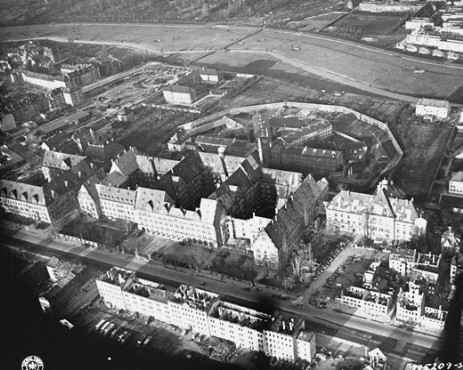
1946 Nuremberg Tribunal: Two Hundred and Ninth Day.
Dr. Robert Servatius (Counsel for the Corps of Political Leaders):The question arises as to how the criminal character of the group is to be established, which is decisive for its conviction. The attitude of the Tribunal can be learned from its ruling of 13 March 1946. The essential factor is participation in the conspiracy. This presupposes the formation of the group for the commitment of a specific act which has been declared criminal by Article 6 of the Charter. Such a formation, however, in the case of every conspirator is based, among other things, on concrete knowledge of the crime contemplated.
As proof of this knowledge the Prosecution alleges the notoriety of the crimes or the comprehensive information available to the Political Leaders. The persecution of the Jews and the conflict with the Church were publicly known as general tendencies. The criminal excesses proceeding from them were not known.
In this connection the following is also important: The thing that matters is not the general knowledge of the facts, but the general knowledge of the motives behind them. Unless We are concerned with, genuine war crimes, the motive for aggressive war must be known; the actions must have been recognizable as the first stage of a war of aggression. Only in this way could participation in the criminal conspiracy result.
The Prosecution concludes that these motives must have been self-evident to the persons affected from the doctrine of National Socialism. There, it is claimed, aims were stated Which of necessity had to lead to a war of aggression. In this way even building up the Party and recruiting members, as well as the seizure of power, become criminal, proceeding from the motive of a war of aggression. It is claimed that an alliance existed for waging an aggressive war or for the commission of war crimes. Is this conclusion correct?
As manuals, the Political Leaders had the Party Program and the book Mein Kampf. The Party Program had been attacked vigorously by domestic opponents, but no official foreign agencies had objected to it. In 1925 the Interallied Rhineland Commission in Coblenz had approved the Party Program for the Rhineland, and later the League of Nations had done likewise for Danzig. The Party was permitted, including its philosophy as expressed in the book Mein Kampf. Besides, it was known that Hitler had declared that his book was out of date in many points.
It is true that the goals to which the Party aspired could lead to a war, and it is also true that a war which aims at something which infringes on the property of someone else, must include an attack on such property. But the slogans "Lebensraum" (Living Space) and "Los von Versailles" (Away with Versailles) just as little as the slogan "Workers of the world unite" is bound to result in aggressive war. A door always remains open to negotiation through an appeal to reason. Just as strikes, uprisings, and revolutions within a state can be justified for workers in their struggle for existence, so wars may come about in the life of nations. But the normal way is that of negotiation. Otherwise, any member of an opposition party could be prosecuted for high treason.
That an aggressive war was actually waged, which would obviously go beyond the technical concept of the opening of hostilities, has been contested with cogent arguments in the proceedings before the Tribunal by many of the major defendants. If Hitler demanded living space, the result of the war forces one to believe that other nations are taking it without condemning the principle which as a "law of life" is supposed to have been the cause of this war. The archives of the world remain closed.
For the Defense it is not so important to determine whether an aggressive war was waged, but rather to determine whether the Political Leaders knew about it and whether it became generally obvious to them.
1961 Iron Curtain: Ida Siekmann jumps from a window in her tenement building, trying to flee to West Berlin, becoming the first person to die at the Berlin Wall. [For further information, click here.]
1968 Iron Curtain: Czechs protest against Soviet invasion:
In the streets of Prague and in the United Nations headquarters in New York City, Czechs protest against the Soviet invasion of their nation. The protests served to highlight the brutality of the Soviet action and to rally worldwide condemnation of the Soviet Union.
On August 21, 1968, more than 200,000 troops of the Warsaw Pact crossed into Czechoslovakia in response to democratic and free market reforms being instituted by Czech Communist Party General Secretary Alexander Dubcek. Negotiations between Dubcek and Soviet bloc leaders failed to convince the Czech leader to back away from his reformist platform. The military intervention on August 21 indicated that the Soviets believed that Dubcek was going too far and needed to be restrained. On August 22, thousands of Czechs gathered in central Prague to protest the Soviet action and demand the withdrawal of foreign troops. Although it was designed to be a peaceful protest, violence often flared and several protesters were killed on August 22 and in the days to come. At the United Nations, the Czech delegation passionately declared that the Soviet invasion was illegal and threatened the sovereignty of their nation. They called on the U.N.'s Security Council to take action. The Council voted 10 to 2 to condemn Russia's invasion; predictably, the Soviet Union vetoed the resolution.
The 1968 invasion of Czechoslovakia severely damaged the Soviet government's reputation around the world, and even brought forth condemnation from communist parties in nations such as China and France. Nonetheless, Dubcek was pushed from power in April 1969 and the Czech Communist Party adopted a tough line toward any dissent. The "Prague Spring" of 1968, when hopes for reform bloomed, would serve as a symbol for the so-called "Velvet Revolution" of 1989. In that year, Czech dissidents were able to break the Communist Party's stranglehold on their nation's politics by electing Vaclav Havel, the first noncommunist president in 40 years. (History.com)
Edited by Levi Bookin (Copy editor)
levi.bookin@gmail.com



Click to join 3rdReichStudies



Disclaimer: This site includes diverse and controversial materials—such as excerpts from the writings of racists and anti-Semites—so that its readers can learn the nature and extent of hate and anti-Semitic discourse. It is our sincere belief that only the informed citizen can prevail over the ignorance of Racialist "thought." Far from approving these writings, this site condemns racism in all of its forms and manifestations.
Fair Use Notice: This site may contain copyrighted material the use of which has not always been specifically authorized by the copyright owner. We are making such material available in our efforts to advance understanding of historical, political, human rights, economic, democracy, scientific, environmental, and social justice issues, etc. We believe this constitutes a "fair use" of any such copyrighted material as provided for in section 107 of the US Copyright Law. In accordance with Title 17 U.S.C. Section 107, the material on this site is distributed without profit to those who have expressed a prior interest in receiving the included information for research and educational purposes. If you wish to use copyrighted material from this site for purposes of your own that go beyond 'fair use', you must obtain permission from the copyright owner.
Please Note: The list-owner and moderators of 3rdReichStudies are not responsible for, and do not necessarily approve of, the random ads placed on our pages by our web server. They are, unfortunately, the price one pays for a 'free' website.